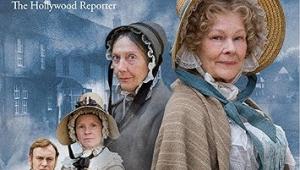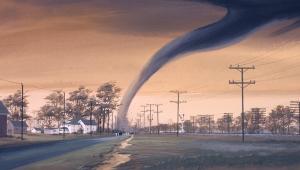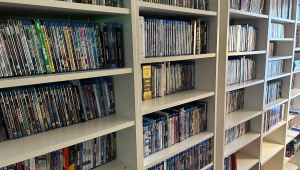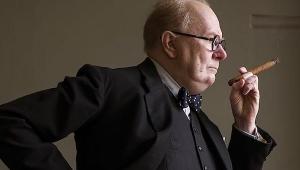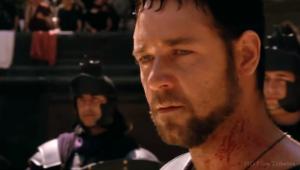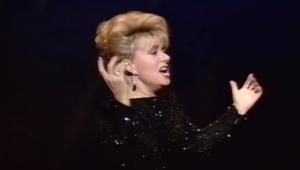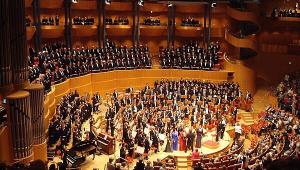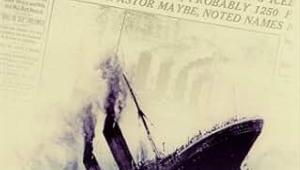Without a doubt, my favorite soundtrack by James Horner is GLORY. My number two album would have to be APOLLO 13.
Remembering Film Composer James Horner

The art of film scoring attracts a wide range of talents, but we recently lost one of the best. James Horner died late last month when the private plane he was piloting crashed in a California forest.
I first discovered Horner's work in 1982 with his score for Star Trek II: The Wrath of Khan. I knew I loved the film's music, but wasn't aware of who wrote it. At the time I was more into the music itself and, like many film fans, didn't spend much time obsessing over the composer. I wasn't totally oblivious to famous movie composers, however. In 1977, when I saw Star Wars, I recall thinking that I would have liked to have heard what Bernard Herrmann might have done with the score to that film. But Herrmann had died in 1975. The rest was (John Williams') history.
I didn't closely link Horner to his film scoring until 1989, when his work for Glory entered audiophile lore. The score for that film was not only stunning, but stunningly recorded by Shawn Murphy. Murphy was arguably the best music recording engineer and mixer working in Hollywood at the time. He still may be. No one was, or is, better at capturing the sound of a symphony orchestra (particularly in its depth and the ambience of its environment) on (then) tape or (now) digital files.
Murphy has recorded most of John Williams' and James Newton Howard's scores from the 80s to the present. He also collaborated with James Horner from the late 1980s up to and including Horner's seminal score for 1997s Titanic. And a great team it was, helped immeasurably by the facilities and acoustics of the now closed Todd-AO scoring stage. My favorite Horner scores were composed during this period, some of them well known, some less so, including Glory, The Rocketeer, Sneakers, The Man Without a Face, Braveheart, Casper, Apollo 13, Field of Dreams, Cocoon, Aliens, and Titanic. His enormous contributions to film continued well past 1997 as well, including but not limited to The Mask of Zorro, The Perfect Storm, Enemy at the Gates, A Beautiful Mind and Avatar.
All in all, James Horner worked on more than 100 films. Unlike typical music composition, however, scoring a film is a collaborative effort; the musician must satisfy the filmmaker while meeting crushing deadlines. This means that composers (some more than others) often borrow from classics long out of copyright (if they ever had one in the first place—did Mozart copyright his work?). Or they borrow bits and pieces from other films, or even from themselves. The classic example of a Horner "borrowing" from the classics is his scoring for the Enterprise escaping dry dock in Star Trek III: The Search for Spock. The music behind this sequence was directly sourced from Prokofiev's Romeo and Juliet Suite. But it works. And filmmakers are also known to demand "something like" a piece of music they've heard elsewhere, and want the score by yesterday. They may even decide to go with the jury-rigged "temp track" inserted during post-production, or demand that the composer ape the same style.
Horner often borrowed as much from himself as from others. This could be distracting for those of us who are familiar with film scores. There are strains of Sneakers in Apollo 13, and the score of Avatar has more than a passing resemblance to much of the music in both Glory and Titanic.
You can hear signature Horner elements in many of his scores. These include a four-note riff (do, do, re, do—humming isn't much help in a written blog!), played on a distant trumpet and often signaling an imminent threat or battle. He was also fond of flutes, panpipes and snare drums.
"Homages," to both his own work an others' aside, however (again, part and parcel of the movie business—and not just in scoring), Horner gave us endless hours of listening pleasure in the theater and at home, both in how his music enhanced the movies themselves (for those of us who love film music) and as works that could stand on their own. I've collected many of his scores on CD over the years. They're often unique in one respect; every album includes at least one extended track that wouldn't be out of place in the concert hall. One of my favorites, which I use frequently as a demo piece because it's so well recorded (Shawn Murphy at his best) is "Playtronics Break-In" from Sneakers. Here, as is typical of Horner's work, the quiet portions are every bit as moving as the explosive climaxes.
The growth of my collection of film scores on CD has slowed in recent years, but only because they're so often available in their intended form—in the film on Blu-ray with full, lossless, multichannel sound. While it's extremely rare to find Horner's music isolated on a separate audio track (which I'd love to see more often, as in the original DVD release of Apollo 13 but not on the later Blu-ray), we can now enjoy it in the medium for which it was written. Sadly, there will be no new material from James Horner, but what he left us can now be treasured well into the future.
- Log in or register to post comments


All the scores mentioned have been wonderful. "Legends Of The Fall" received much of its beautiful feeling from Horner's gorgeous Oscar nominated score. Many will post favorites. James Cameron reportedly remarked that "Braveheart" was the best score he ever heard before he made up with Horner and they gave us "Titanic" together.

James Horner is my favorite composter. His music are also used as background music in many online games. Thanks for sharing this useful information.

No one was, or is, better at capturing the sound of a symphony orchestra (particularly in its depth and the ambience of its environment) on (then) tape or (now) digital files.
